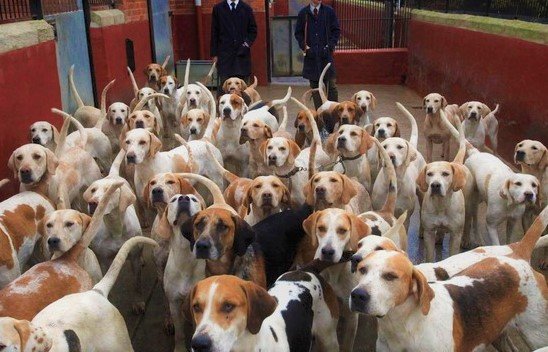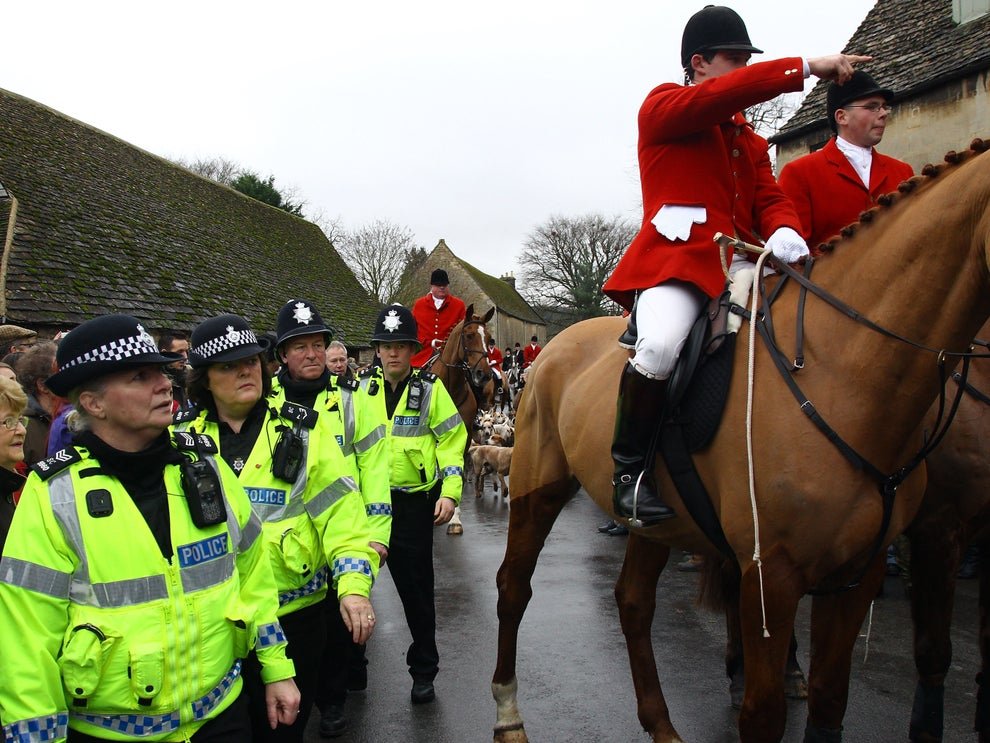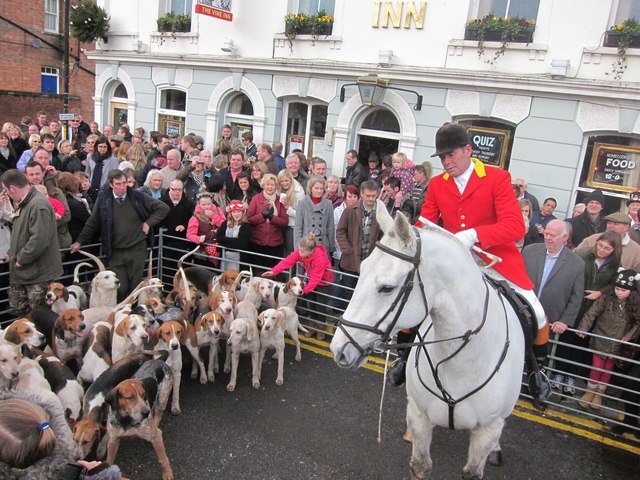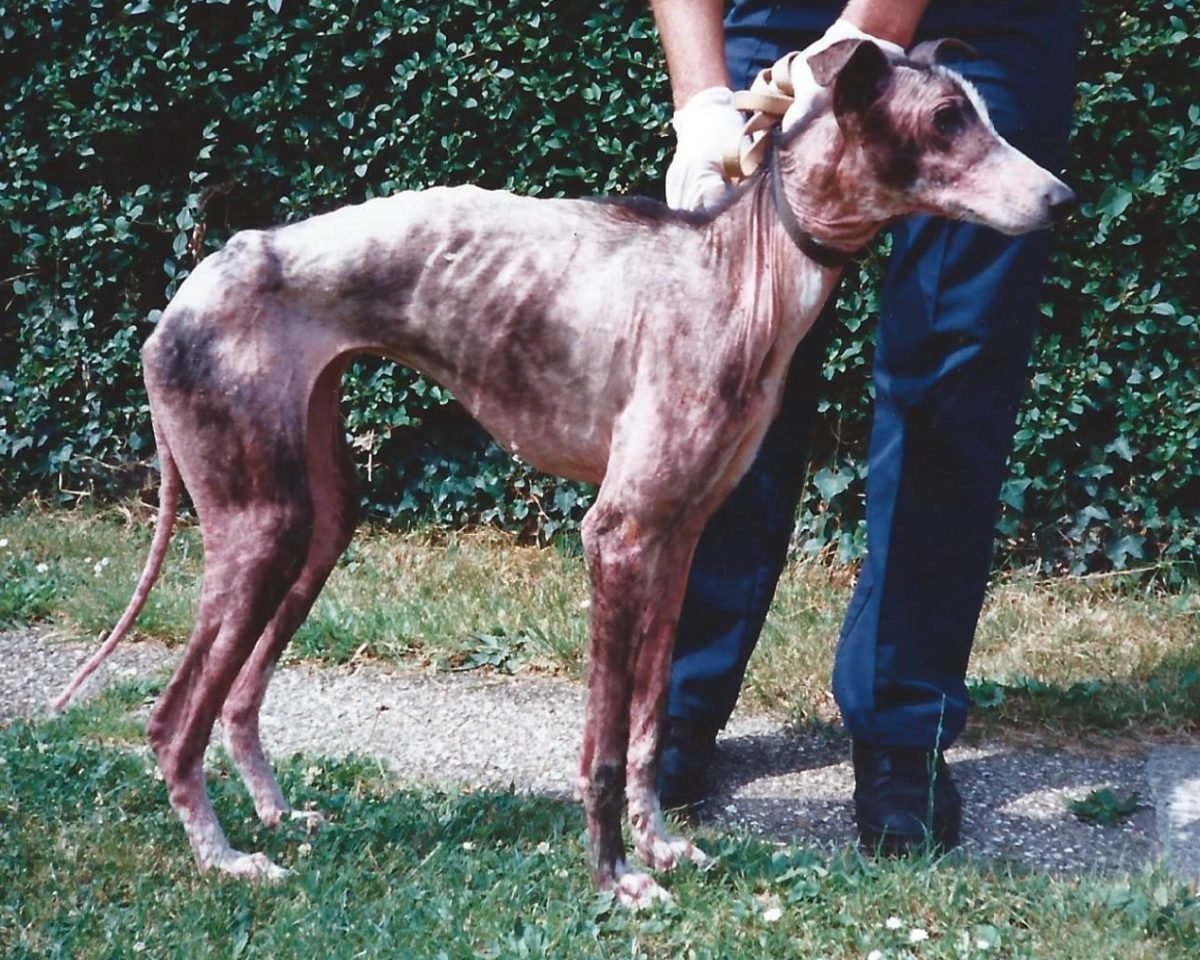It is now 17-years since fox hunts were banned, but thanks to loopholes in the law and the impracticability of enforcing it, illegal hunting continues under the guise of exercising the hounds and drag hunts.
As entertainment, city and rural folk alike still love the theatre, tradition and fun of watching the hunt congregate and set off and will turn out in their thousands for the Boxing Day and New Year hunts little caring what happens afterwards. In areas that host a hunt it is all Tally Ho, port and mulled wine and of course children just love to mingle with the hounds.

Fox hunts have become pantomime.
There will be cheers and clapping from supporters and jeers and boos from a handful of valiant protestors to give the event some element of spice and a few police officers to keep things orderly. Sadly the Yuletide hunts have become pantomimes for families looking to get some fresh air after the big day. Everyone will have a good time and the reason for any commotion caused by demonstrators will no doubt pass them by.
Violence is still common between the opposing sides and this state of affairs has perpetuated for nearly two decades and will continue probably for several more until the hunts fulfil their aim of overturning the ban. The more we attend these pantomimes without thought to what they represent the more credence we give to this aim. It gives them the opportunity to point out how much the public love them.
It does appear that the general public are not sufficiently aware of what constitutes a legal or illegal meet or even care. They may also be getting weary of the subject and have come to accept that hunting with dogs whether legal or not is here to stay. They obviously put their trust in the pillars of society who they see before them on horseback dressed in their liveried smart red, blue, yellow or black jackets to do the right thing. But as a recent event has shown this trust is unworthy.
Illegality encouraged by a hunt governing body.
There is no doubt that illegal fox hunting is common and that this trust we appear to have is undeserving, a fact well illustrated by the recent prosecution and guilty verdict of Mark Hankinson, the Director of the Masters of Foxhounds Association on the 15 October 2021. He was found guilty of encouraging illicit meets by holding secret webinars explaining to hunt bosses the best ways to disguise their drag hunts and was fined £1000 with costs of £2500. The judges summing up was quite condemning:
I am sure that the Defendant through his words was giving advice on how to illegally hunt. This was through the pretence of laying trails which it could be said the hounds were following. As he himself said, he was speaking to ‘like-minded people’ and could therefore speak freely. He did not expect his words to be recorded and released into the public domain. It was clearly advice and encouragement to commit the offence of hunting a wild mammal with a dog. I am sure he intended to encourage the commission of that offence. I find the Defendant guilty of the offence before me.
Regina v Mark Hankinson
This even prompted the National Trust, a bastion of history and rural tradition to vote two to one to ban drag hunting on their land as many other landowners are doing.

Class war obsession with fox hunts.
There has always been the accusation from hunt supporters that the ban was an attack on rural traditions and was part of a “class war obsession“, but fox hunting with hounds cannot be considered as an inclusive sport by any means.
There is a rather pompous etiquette associated with the sport which both human and equine participants must adhere to and a hierarchy amongst the inner sanctum. You need a sturdy bank balance just to kit yourself out without taking into consideration the cost of owning and caring for a horse. This discounts most normal hardworking people (as Governments like to call us) from being able to partake.
Worst gaffe is to refer to the hounds as dogs.
Among many other things the etiquette stresses that smartness is essential with a tweed, black or navy jacket worn over a shirt with a knotted tie, pale breeches, clean boots and gaiters, and dark gloves and hats. If a body protector is worn it must be under the jacket so as not to spoil the ensemble. For the “girls”, hairnets are allowed but only subtle make-up.
For some strange reason a horse’s mane must be plaited “as a courtesy to those whose land you are crossing,” otherwise you might be sent home like a naughty schoolchild. And most importantly you must smile and politely pass the time of day with the farmer or landowner whose land you are trashing should you come across him or her leaning on a gate.
Among the worst gaffes you can make is to refer to the hounds as dogs, is to overtake the master during the hunt and most importantly after the hunt has ended not to say thank you and goodnight (“which is the traditional way to say goodbye even if it is 9 a.m.”) to the master and secretary.
With all this in mind it is difficult not to label the blood sport as a class and well-heeled person’s pastime, but easy to believe that the present status of fox hunting can only be described as a charade.



